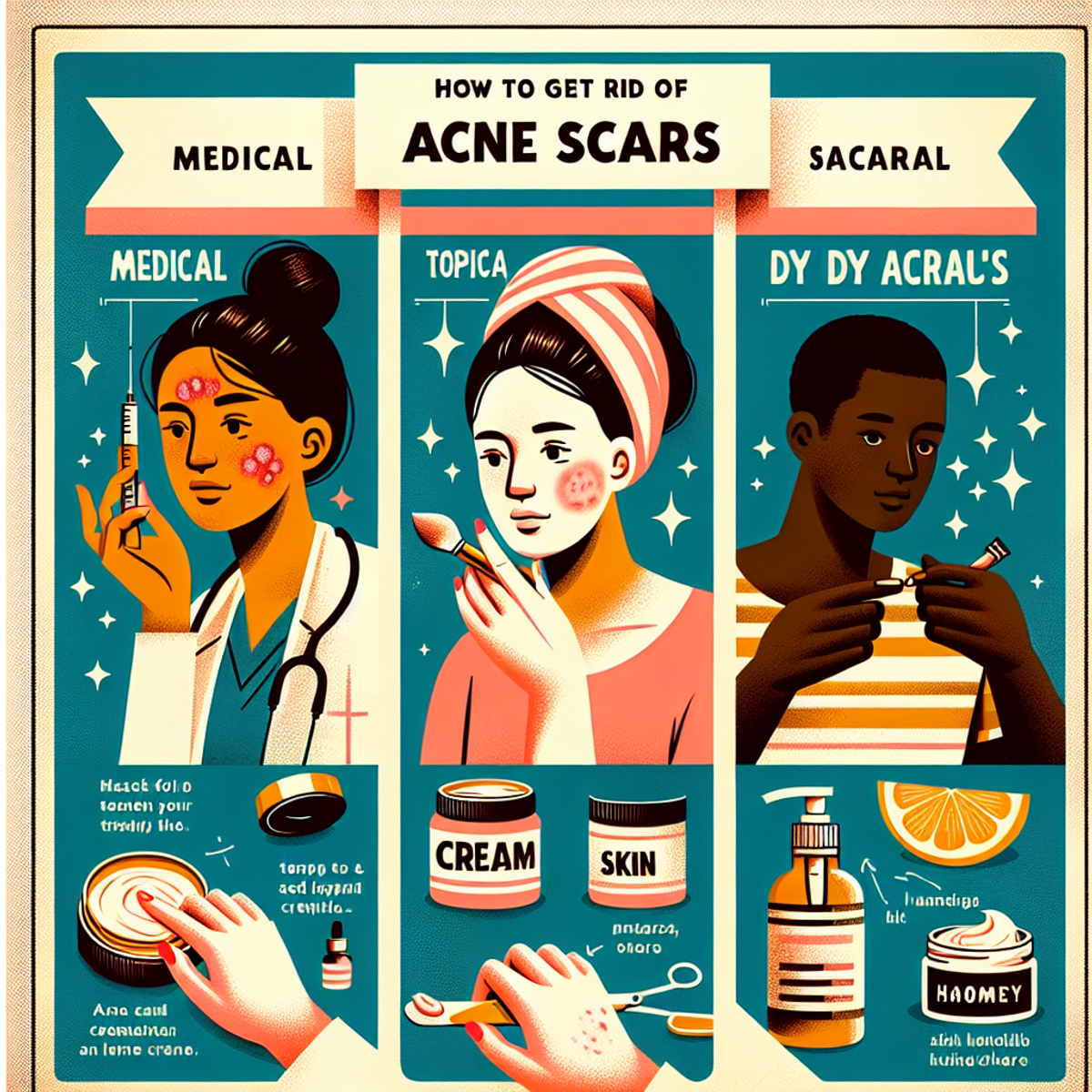How to Get Rid of Acne Scars: Medical, Topical and DIY Treatments

Introduction
Dealing with acne scars can be challenging. Not only do they affect how we look, but they can also take a toll on our self-esteem. That’s why finding the right treatment is crucial. In this article, we’ll explore different ways to treat acne scars – from medical procedures and topical creams to homemade remedies.
Understanding Acne Scars
Acne scars come in various forms, such as:
- Shallow depressions: These are small indents on the skin’s surface.
- Deep pitted scars: They are larger and more noticeable than shallow depressions.
- Raised keloids: These are thick, raised scars that extend beyond the original acne blemish.
It’s important to note that everyone’s skin is unique, and what works for one person may not work for another. That’s why it’s essential to know about all the available options.
Exploring Treatment Options
We’ll discuss three main types of treatments:
- Medical treatments: These are procedures performed by professionals, such as chemical peels or injections.
- Topical treatments: This includes using creams or products that you can buy without a prescription.
- DIY home remedies: Natural ingredients found in your kitchen that you can use to create your own treatments.
By learning about these different approaches, you’ll be able to decide which one suits you best:
- If you prefer professional guidance and are open to medical interventions, then medical treatments might be your choice.
- If you like the convenience of using products at home, then topical treatments could be worth considering.
- And if you enjoy taking a natural approach and experimenting with homemade solutions, then DIY remedies might be the way to go.
No matter which method you choose, remember that there are ways to reduce the appearance of acne scars and improve your skin’s health.
Now, let’s explore these treatment options in detail!
Medical Treatments for Acne Scars
When it comes to addressing acne scars, medical treatments offer advanced solutions that can significantly improve the skin’s appearance. These procedures are typically performed by dermatologists or trained medical professionals and can target various types of acne scars, including atrophic, hypertrophic, and keloid scars.
1. Chemical Peels
- Procedure: Chemical peels involve the application of a chemical solution to the skin, which causes it to exfoliate and eventually peel off. This process stimulates the growth of new skin cells, leading to a smoother complexion.
- Effectiveness: Chemical peels can help reduce the appearance of mild to moderate acne scars, particularly those caused by hyperpigmentation or superficial scarring. A study published in the Journal of Clinical Medicine highlighted their efficacy in scar improvement.
2. Laser Therapy
- Procedure: Laser therapy utilizes concentrated beams of light to target damaged skin cells and stimulate collagen production. This promotes skin renewal and can effectively diminish the visibility of acne scars.
- Effectiveness: Depending on the type of laser used, this treatment can address both superficial and deep acne scars with minimal downtime. Research published in the Dermatologic Surgery journal has shown positive outcomes for patients treated with laser therapy.
3. Microneedling
- Procedure: Microneedling involves the use of a device equipped with fine needles that create micro-injuries in the skin. This process triggers the body’s natural healing response, leading to increased collagen synthesis and overall skin rejuvenation.
- Effectiveness: Microneedling is particularly effective for treating atrophic acne scars, as it helps fill in depressions in the skin caused by scarring.
4. Dermal Fillers
- Procedure: Dermal fillers are injectable substances that are used to plump up depressed or sunken areas of the skin affected by acne scarring. Common fillers include hyaluronic acid and poly-L-lactic acid.
- Effectiveness: Dermal fillers provide immediate volume enhancement, effectively minimizing the appearance of certain types of acne scars.
5. Injections
- Procedure: Injections such as corticosteroids or collagen-stimulating substances may be used to target specific types of acne scars, particularly hypertrophic or keloid scars.
- Effectiveness: These injections can help flatten raised scars and reduce redness associated with certain types of acne scarring.
Medical treatments for acne scars offer a range of options tailored to different scar types and individual preferences. Consulting a dermatologist is crucial for determining the most suitable treatment based on an individual’s skin condition and scar severity.
Topical Treatments for Acne Scars
When it comes to dealing with acne scars, incorporating topical treatments into your skincare routine is crucial for managing and reducing their appearance. These treatments provide a non-invasive way to improve your skin without resorting to any surgical procedures. Understanding the different types of topical treatments available and their effectiveness can help you make an informed choice when it comes to treating your acne scars.
Medicated Creams
One effective approach to treating acne scars is using medicated creams specifically formulated for this purpose. These creams contain active ingredients that promote new skin growth and reduce the visibility of scars. Hydroquinone, corticosteroids, or tretinoin are commonly found in these creams, all of which work towards evening out your skin tone and texture. However, the effectiveness of these medicated creams can vary depending on the severity of your scars and how your skin reacts to them.
Retinoids
Another popular option for addressing acne scars is the use of retinoids, which are compounds derived from Vitamin A. Retinoids like tretinoin, adapalene, and tazarotene accelerate the process of shedding dead skin cells and generating new ones. This gradual renewal can significantly reduce the appearance of acne scars over time. However, it’s important to note that retinoids make your skin more sensitive to sunlight and may take some time before noticeable improvements become visible.
Over-the-Counter Products
For those seeking more readily available options, there are also over-the-counter products specifically designed for treating acne scars. These products often contain key ingredients such as salicylic acid and alpha hydroxy acids (AHAs). Salicylic acid exfoliates the skin and unclogs pores, minimizing the appearance of scars. AHAs, on the other hand, improve skin texture and reduce discoloration caused by acne scars. When choosing over-the-counter products, ensure they have these ingredients to maximize their potential effectiveness.
By incorporating medicated creams, retinoids, or over-the-counter products into your skincare routine, you can actively focus on treating your acne scars and aim for smoother and more even skin. However, it’s always advisable to consult a dermatologist or skincare professional first. They can recommend the most suitable topical treatments based on your specific skin type and the severity of your acne scars.
DIY Home Remedies for Acne Scars
When it comes to addressing acne scars, some people prefer to explore do-it-yourself (DIY) remedies at home. These natural treatments often involve common household ingredients and may have various benefits for the skin. Here’s a closer look at some popular DIY home remedies for acne scars:
Importance of Safety and Patch Testing
Before trying any DIY remedy, it’s crucial to prioritize safety and conduct a patch test. This step helps to ensure that the chosen ingredient does not cause any adverse reactions or allergies on your skin.
Aloe Vera
How to Use: Extract the gel from an aloe vera leaf and apply it directly to the affected areas.
Aloe vera is known for its soothing and moisturizing properties. It may help reduce inflammation and promote healing, potentially improving the appearance of acne scars over time.
Honey
How to Use: Apply a thin layer of raw honey to the acne scars and let it sit for about 10-15 minutes before rinsing off with warm water.
Honey is praised for its antimicrobial and antioxidant properties. It may aid in skin regeneration and contribute to a more even skin tone.
Rosehip Oil
How to Use: Gently massage a few drops of rosehip oil onto the affected areas until fully absorbed.
Rosehip oil is believed to support skin regeneration and improve overall skin texture, potentially diminishing the appearance of acne scars due to its richness in essential fatty acids and vitamins.
Potato Peel Mask
How to Make: Grate a potato and collect the peels. Blend the peels with water to create a paste, then apply it as a mask for 10-15 minutes before rinsing off.
Potato peels contain enzymes and vitamin C that are thought to have skin-brightening properties. While there is anecdotal evidence supporting its effectiveness in reducing hyperpigmentation, more research is needed in this area.
Jojoba Oil for Face
How to Use: After cleansing your face, apply a few drops of jojoba oil onto the acne scars and gently massage it into the skin until fully absorbed.
Jojoba oil is a natural moisturizer that closely resembles the skin’s sebum. It may help regulate oil production, fade acne scars, and improve overall skin texture.
By incorporating these DIY home remedies into your skincare routine, you may discover natural alternatives that complement other treatments for acne scars. However, it’s important to manage expectations and be patient as results may vary for different individuals. Always consult with a dermatologist before trying new skincare regimens, especially if you have sensitive or reactive skin.
Furthermore, if you’re interested in exploring more about how to achieve a brighter complexion and address hyperpigmentation concerns, you can learn about the difference between skin brightening and skin lightening. This knowledge can help you make informed decisions about your skincare routine and choose the most suitable remedies.
Prevention Measures for Acne Scars
Acne scars can be stubborn and difficult to treat, which is why prevention is key. By taking proactive steps to prevent acne and minimize inflammation, you can significantly reduce the risk of developing acne scars. Here are some important prevention measures you should incorporate into your skincare routine:
1. Seek Prompt Acne Treatment
When it comes to preventing acne scars, early intervention is crucial. As soon as you notice the first signs of acne, such as blackheads, whiteheads, or pimples, it’s essential to seek prompt treatment. Consulting a dermatologist will help you determine the most suitable treatment plan for your specific skin type and severity of acne.
2. Avoid Picking or Popping Acne Lesions
Resist the temptation to pick or pop your acne lesions. While it may be tempting to squeeze out a pimple, doing so can cause further inflammation and damage to the skin tissue. Picking at acne can lead to increased redness, swelling, and a higher chance of scarring. Instead, allow your acne lesions to heal naturally or follow the guidance of a dermatologist on safe extraction techniques.
3. Protect the Skin from Sun Exposure
Excessive sun exposure can worsen acne scars and darken their appearance. When exposed to UV rays, the skin produces more melanin, causing hyperpigmentation and making scars more noticeable. To protect your skin from sun damage:
- Apply a broad-spectrum sunscreen with an SPF of 30 or higher every day.
- Wear protective clothing such as hats and long-sleeved shirts when spending time outdoors.
- Seek shade during peak sun hours (usually between 10 am and 4 pm).
4. Use Non-Comedogenic Skincare Products
Non-comedogenic products are specifically formulated not to clog pores, reducing the likelihood of new breakouts and subsequent scarring. When choosing skincare products such as moisturizers, cleansers, and makeup, look for labels that indicate they are non-comedogenic or oil-free. These products are less likely to contribute to the development of acne.
5. Develop a Consistent Skincare Routine
Establishing a consistent skincare routine is essential for preventing acne and minimizing the risk of scarring. Here are some basic steps you should include:
- Cleanse your face twice daily using a gentle cleanser suitable for your skin type.
- Exfoliate regularly to remove dead skin cells and unclog pores, but avoid over-exfoliating as it can irritate the skin.
- Apply a moisturizer to keep your skin hydrated and prevent excessive dryness.
- Use products containing ingredients known to be effective against acne, such as salicylic acid or benzoyl peroxide, as recommended by your dermatologist.
Remember that consistency is key when it comes to skincare routines. Give your skin time to adjust to new products and treatments, and be patient with the results.
By incorporating these prevention measures into your daily routine, you can significantly reduce the likelihood of developing acne scars. However, if you already have existing acne scars, don’t worry—there are still various treatment options available to improve their appearance. Consult a dermatologist for personalized advice on the best treatment plan for your
Consult a Dermatologist for Personalized Advice
When it comes to addressing acne scars, seeking personalized advice from a dermatologist is crucial for effective treatment. A dermatologist can provide tailored recommendations based on your specific skin type, the severity of your acne scars, and any underlying skin conditions. Here’s why consulting a dermatologist is the final word on acne scar treatments:
- Professional Assessment: A dermatologist can assess your skin and determine the most suitable treatment options based on the type and depth of your acne scars.
- Customized Treatment Plan: By consulting a dermatologist, you can receive a
- personalized treatment plan that may include a combination of medical procedures, topical treatments, and home remedies tailored to your unique needs.
- Medical Expertise: Dermatologists have extensive knowledge of various treatments for acne scars, including the latest advancements in dermatological procedures and skincare products.
- Minimization of Risks: With professional guidance, you can minimize the risk of adverse reactions or complications associated with certain treatments, ensuring the safety and effectiveness of your acne scar treatment.
Consulting a dermatologist provides invaluable expertise and personalized care for addressing acne scars effectively. By partnering with a dermatologist, you can embark on a journey towards smoother, clearer skin with confidence and peace of mind.










